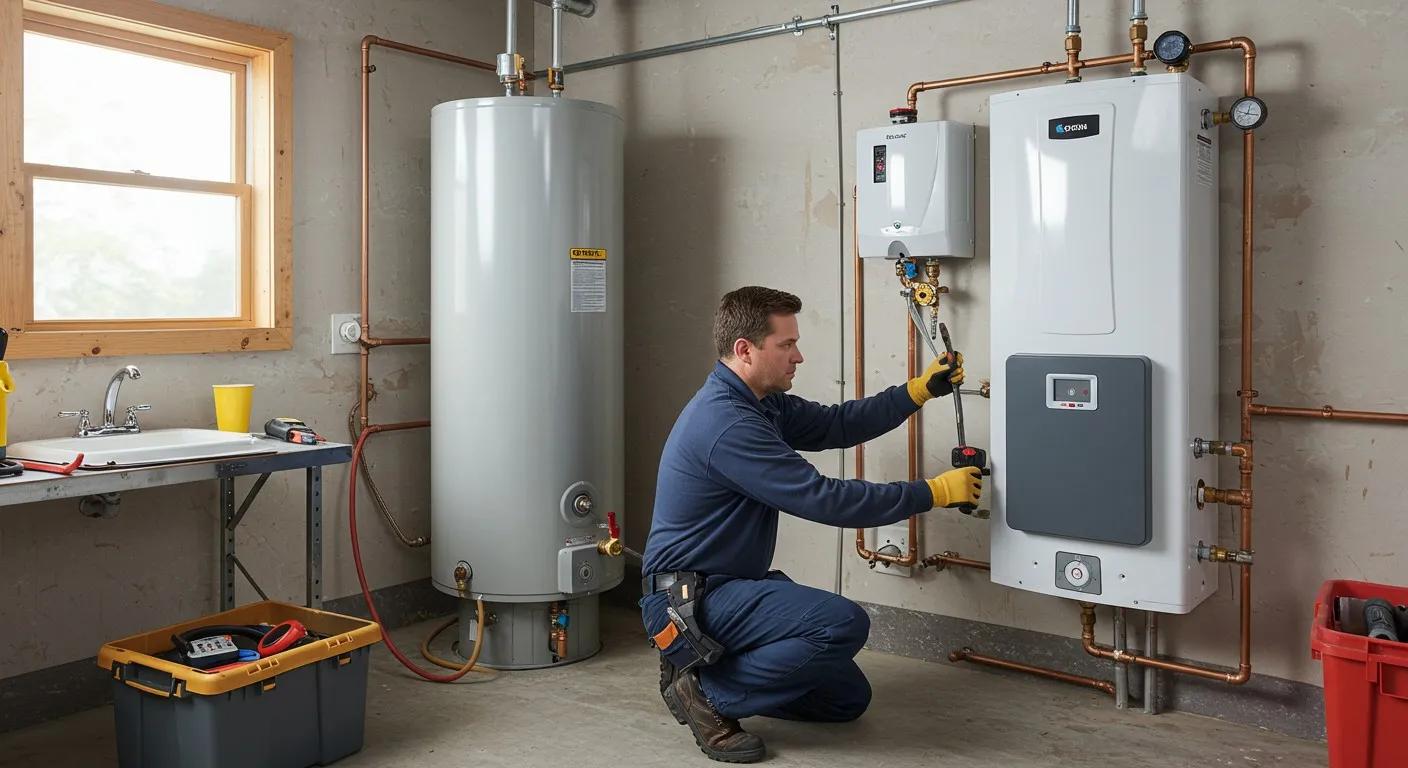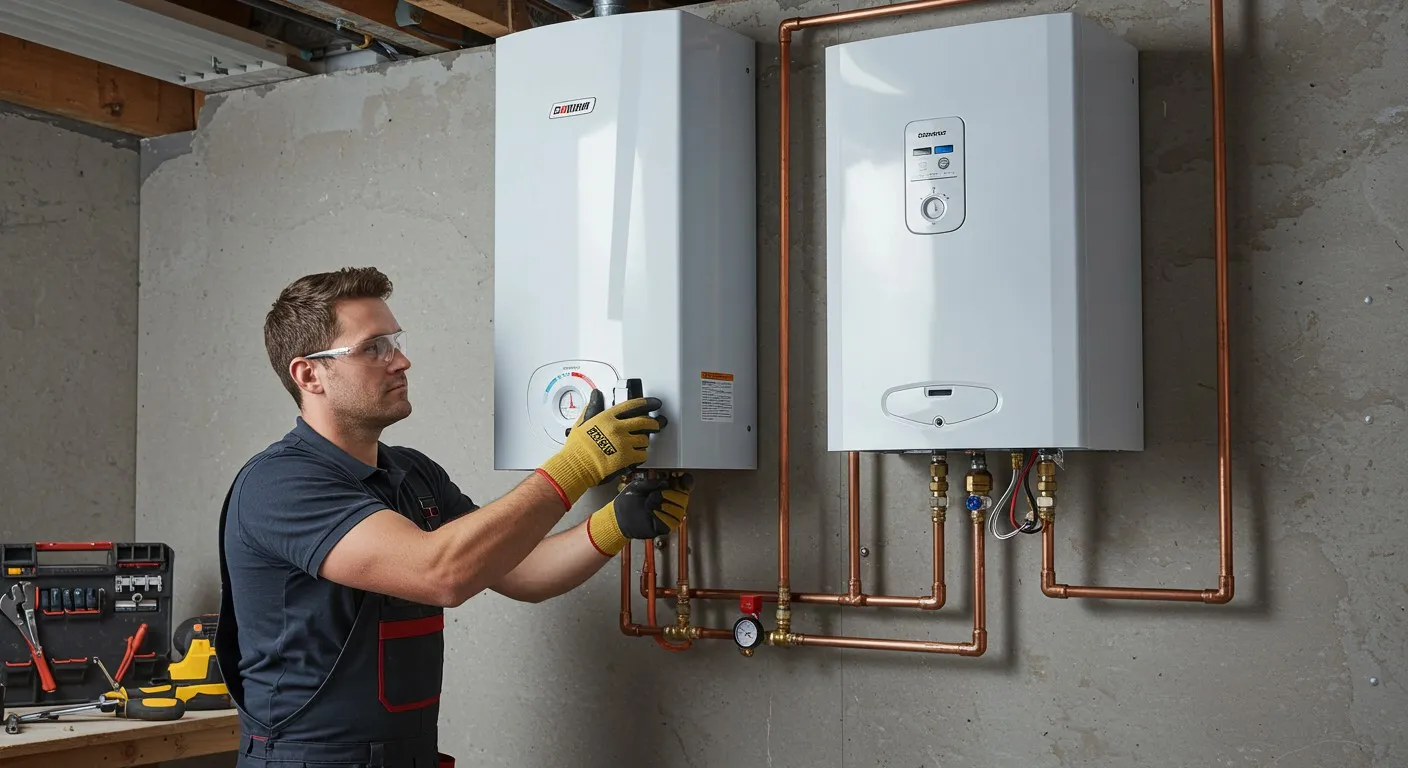Tankless Water Heater Replacement in New Braunfels, TX
Replacing a tankless water heater, or upgrading from a traditional tank unit to a tankless system, is a significant home improvement that offers numerous long-term benefits. For homeowners in New Braunfels, TX, ensuring you have a reliable and efficient source of hot water is essential for daily comfort and utility savings. Whether your current tankless unit is nearing the end of its lifespan or you're ready to make the switch from a conventional tank heater, understanding the replacement process and benefits can help you make an informed decision.
Tankless water heaters, sometimes called on-demand water heaters, heat water directly without the use of a storage tank. This approach provides a continuous supply of hot water and can be significantly more energy-efficient than traditional models. However, like all appliances, they have a finite life and will eventually require replacement.
Why Consider Tankless Water Heater Replacement in New Braunfels?
Several factors might prompt New Braunfels residents to consider replacing their tankless water heater or switching to one:
- Age: Most tankless water heaters have a lifespan of 20 years or more, much longer than traditional tanks. However, as they age, efficiency can decrease, and components may begin to fail, leading to unreliable performance.
- Performance Issues: If your existing tankless unit isn't delivering consistent hot water, struggles to meet demand, or frequently requires repairs, a replacement may be more cost-effective than ongoing maintenance.
- Upgrading from a Tank Unit: Many homeowners with traditional tank water heaters choose to upgrade to tankless for the potential energy savings, space efficiency, and the benefit of endless hot water.
- Efficiency: Newer tankless models boast higher energy efficiency ratings (Energy Factor or Uniform Energy Factor), potentially leading to lower utility bills compared to older models or traditional tanks.
- Sizing: A unit installed years ago might not be adequately sized for current household needs, especially after renovations or changes in occupancy. Replacing it allows for proper sizing.
- Technology Advancements: New tankless heaters come with advanced features, including better temperature control, self-diagnostic systems, and integration with smart home technology.

Replacing an Existing Tankless Water Heater
If you already have a tankless unit, the replacement process involves removing the old unit and installing a new one in its place. While seemingly straightforward, it requires careful attention to gas lines, electrical connections, venting, and water lines.
The process typically includes:
- Assessment: A professional evaluates the existing setup, including gas and water line sizes, venting requirements, and electrical capacity, to ensure compatibility with a new unit.
- Unit Selection: Based on your home's hot water demand (flow rate and temperature rise needed) and fuel type (natural gas, propane, or electric), a correctly sized and specified new tankless heater is chosen.
- Removal: The old unit is safely disconnected from gas, water, and electrical lines and carefully removed.
- Installation: The new unit is mounted, and connections are properly made. This is a critical step that must adhere to manufacturer specifications and local plumbing codes to ensure safe and efficient operation.
- Venting: Proper venting is crucial for gas tankless heaters. The existing venting system may need to be modified or replaced depending on the new unit's requirements (e.g., material, diameter, length, termination point).
- Testing: After installation, the unit is thoroughly tested for proper function, temperature output, and leak detection Leak Detection + Repair.
- Permitting: In many cases, replacing a water heater requires a permit and inspection to ensure the work meets safety standards.
Upgrading from a Traditional Tank to Tankless in New Braunfels
Switching from a tank water heater to a tankless system is often more complex than a like-for-like tankless replacement. This is because tankless units have different requirements for gas lines, electrical power, and venting.
Key considerations when upgrading include:
- Gas Line Sizing: Gas tankless heaters often require a larger gas line than traditional tank heaters due to their higher BTU input. The existing gas line may need to be upgraded by a qualified Gas Plumbers to meet the new unit's demand.
- Electrical Requirements: Tankless units, especially gas ones, require electrical power to operate their igniters, fans, and control boards. Electric tankless heaters require substantial electrical service, often necessitating dedicated, high-amperage circuits and thicker wiring. Your home's electrical panel capacity will need to be assessed.
- Venting: Traditional tank water heaters often use atmospheric venting through a flue pipe. Tankless gas heaters typically use sealed combustion and require different venting materials (like PVC, CPVC, or stainless steel) and configurations, often venting horizontally through a wall or vertically through the roof. This usually requires installing a completely new venting system.
- Water Lines: Tankless units connect to the main cold water line and hot water distribution system. While standard water lines are usually sufficient, the connection points and possibly the main water line from the meter might need evaluation depending on the home's size and the desired flow rate.
- Drainage: Some tankless units, especially high-efficiency condensing models, produce condensate that needs to be safely drained. A condensate drain line may need to be installed.
- Location: Tankless units can be installed in various locations, including indoors or outdoors, and can often free up space previously occupied by a bulky tank. However, the chosen location must accommodate gas lines, electrical access, and proper venting.
Due to these complexities, converting from a tank to tankless requires the expertise of experienced plumbing professionals familiar with both systems and local New Braunfels building codes.
Benefits of a New Tankless Water Heater
Installing a new tankless water heater in your New Braunfels home offers compelling advantages:
- Energy Efficiency: By heating water only when needed, tankless units can be 24% to 34% more energy efficient than conventional storage tank water heaters for homes that use 41 gallons or less of hot water daily (according to Energy.gov). This can lead to significant savings on energy bills over time.
- Endless Hot Water: You won't run out of hot water. As long as the unit is properly sized for simultaneous demand (multiple fixtures running at once), it will continue to heat water on demand.
- Longer Lifespan: Tankless water heaters generally last much longer than traditional tank units, often 20 years or more compared to 10-15 years for tanks.
- Space-Saving: Their compact size allows them to be mounted on a wall or installed in smaller spaces, freeing up valuable storage area previously occupied by a large tank.
- Reduced Risk of Leaks: Without a large tank storing dozens of gallons of water, the risk of a catastrophic flood due to tank failure is eliminated.
- Cleaner Water: Because water is heated on demand, it doesn't sit in a tank where rust and sediment can accumulate.
Choosing the Right Tankless Unit
Selecting the appropriate tankless water heater involves considering:
- Fuel Type: Natural gas, propane, or electric. Gas units typically offer higher flow rates suitable for larger homes or multiple simultaneous uses, while electric units may be suitable for smaller demands or specific point-of-use applications. Availability and cost of fuel in New Braunfels will influence this choice.
- Sizing: This is crucial. The unit must be able to provide the required flow rate (gallons per minute) at the necessary temperature rise (difference between incoming cold water temperature and desired hot water temperature) based on the peak demand in your home (how many hot water fixtures might be used simultaneously). A professional plumber can perform the calculations needed for proper sizing.
- Efficiency Rating: Look for units with high Uniform Energy Factor (UEF) ratings for maximum energy savings.
- Features: Consider features like modulating gas valves (adjusts flame size for precise temperature), built-in freeze protection (important if installed in an unheated space), and warranty.
Professional Installation is Key
Given the complexities of gas lines, electrical connections, venting, and water line integration, professional installation of a tankless water heater is not just recommended, but often required for safety, efficiency, and warranty validation. Attempting a DIY installation can lead to dangerous gas leaks, electrical hazards, improper venting (risk of carbon monoxide), and voided manufacturer warranties.
Experienced Plumbing Services technicians understand the specific requirements of different tankless models, the nuances of converting from tank to tankless, and local building codes in the New Braunfels area. They can ensure the unit is correctly sized, safely installed, and operating at peak efficiency.
Whether you need to replace an aging tankless unit or are ready to enjoy the benefits of upgrading from a traditional water heater, professional guidance and installation are essential for a smooth transition and reliable hot water for years to come in your New Braunfels home. Services related to your water system, such as Water Filtration or Water Softeners, might also be considered to protect your new investment and improve overall water quality.
Financing options
flexible financing solutions

We offer convenient financing options through Wells Fargo, making it easier to invest in plumbing or HVAC upgrades with flexible payments that fit your budget. Your comfort, safety, and satisfaction are always our top priorities—every service, every time.
Apply for Financing
We offer flexible financing options through GreenSky to help you move forward with essential plumbing or HVAC upgrades without delay. With quick approvals and affordable monthly payments, you can get the service you need while staying within budget.
Apply for Financing
We offer financing through Synchrony to make it easier to get the plumbing or HVAC service you need without delay. With simple application steps and convenient monthly payments, you can manage costs while enjoying reliable home comfort.
Apply for Financing
where we serve

